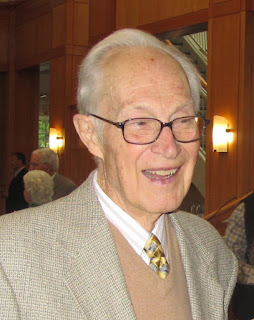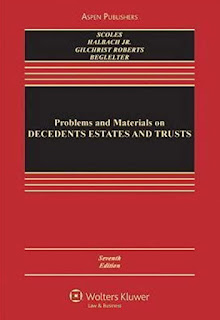 |
| John Moye |
I never had a chance to learn from John in a classroom setting, though I learned plenty from him as his law clerk, associate, and partner. I even missed the chance to have John as my bar review instructor, even though by one account he trained nearly 400,000 U.S. law graduates to take the bar. In an ironic twist, BarBri did not use John to teach contracts or commercial law for the Colorado Bar in 1981. I learned what I was missing from several Oregon law school classmates who were studying to take the Oregon Bar and called me to tell me how fantastic John was. “I wouldn’t know,” was my petulant reply.
Thinking about John this week, I recalled another great law professor that I did have the opportunity to learn from: Gene Scoles, former dean of the University of Oregon School of Law and distinguished professor emeritus. Were he still living, Gene would be 101 years old this Sunday.
As a member of the Class of 1981, I was among the last few to have had the privilege of being a student of Gene’s – he retired in 1982. And when I say the last few, I mean the very few. In the late 1970s Gene had unfairly garnered a reputation as the “Charles Kingsfield” of the University of Oregon School of Law, which I am sure accounted for the paucity of students in his classes. Fortunately, my friend Dave Foraker had taken Gene’s Trusts and Estates I class and recommended it highly.
Upon arrival in Gene’s T&E I class I quickly realized that –while Gene certainly could have matched wits with the legendary contracts professor of The Paper Chase – he was hardly severe, though his quest for excellence in teaching and learning was relentless. What was perceived by some as gruffness or stiffness was simply being old-school; Gene was a gentleman, a bona fide throwback in the more laid-back law school milieu of that time. Those of us who experienced Gene first-hand were not about to dispel other’s misimpressions, since it resulted in classes sizes that were akin to master’s classes with the Dean emeritus. There may have been 11 students – certainly no more than 17 – in Gene’s Spring 1981 Conflicts of Laws class.
Gene’s T&E I class was among the most challenging I ever took. Preparation time was easily double any other class I had that semester. But with Gene at the lectern I still got far more out of it than I put into it. Gene would stop his lecture at any time for a question, and I had lots of questions. His patience, knowledge, willingness, and ability to clearly to answer every question I could posit were unsurpassed. So, heeding my father’s counsel that “when you find a professor you like, take everything he teaches, even if it’s not a subject you normally would have taken,” I reenlisted for T&E II: Future Interests.
Springing interests . . . shifting interests . . . The Rule in Shelly’s Case . . . fertile octogenarians! Once again Gene’s class challenged me, but was equally rewarding. My clearest and fondest memory of that class was the final examination. I had taken up my usual station in one of the back rows for the test. As it was being distributed from the front of the room I heard a growing sotto voce chorus of grumbling. When the examination finally reached me I quickly scanned it.
The exam was three pages long. The first half-page or so posited a hypothetical client who has come to you after someone has died, and described the decedent’s various family relations. This was followed by a one-page Last Will and Testament. Turning to the final page there was a single question: Who gets what, and why? It immediately occurred to me, and has ever since, that this was the most practical final exam I had ever received in law school.
Another clear memory of Gene
exposed not aloofness, but rather a delightful academic detachment from the
mundane. We were discussing how a Will
might possibly be altered without detection.
Gene described with admiration and amazement how his secretary could
remove a staple from document and replace it, leaving virtually no trace! Upon inquiry it was apparent Gene was
completely oblivious to the invention and use of a “staple puller.”
Gene Scoles
Of all the wonderful teachers I was fortunate to have had at the U of O, none surpassed Gene in dedication, excellence, or caring about his students. With his old-school manners and gentility, he stood out in every way. When Gene passed it became clear reading the other tributes that our secret was not well kept, and that we were genuinely blessed that this great son of Iowa chose Eugene, and its law school, to call home.
Happy Birthday, Gene.


No comments:
New comments are not allowed.